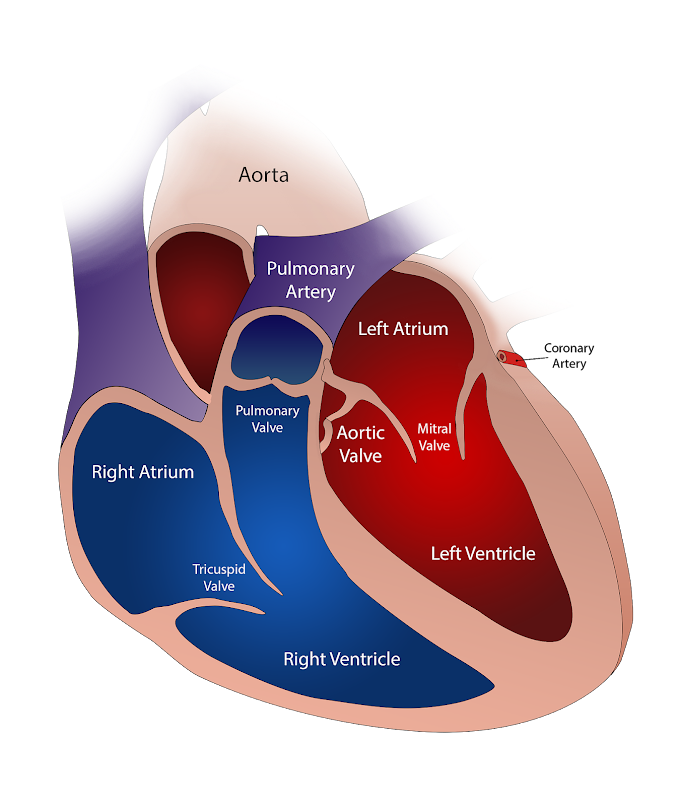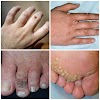SYMPTOMS
It is only
with great effort that the person can exhale air from his lungs. There is
continual breathlessness. Most any exertion brings coughing. It is hard to
breathe in, but worse to breathe out. The neck veins often stand out from the
effort; and he breathes through the mouth in order to try to get enough air in
and out. Breathing is usually rapid and short. He may breathe 25-30 times a
minute; and he still does not get enough air.
Eventually his chest becomes barrel-shaped,
his face ruddy, and he speaks with short and broken phrases.
CAUSES
The word,
“emphysema,” comes from a Greek word meaning “to puff up with air.” The walls
of the lungs lose their elasticity; so air cannot be easily pushed in and out,
as should normally happen. There is air in the lungs, but it is not moving in
and out. As emphysema progresses and the obstruction to airflow increases, the
lungs enlarge with trapped air.
The most frequent cause is smoking; but dust and air pollution also receives some of the blame. Live in the
country and do not have tobacco in your home; and you should be able to avoid
this problem.
Emphysema has become the most common modern
lung infection in the Western world. Needing a continual exchange of air to
survive, we use about a thousand cubic feet of air each day. It passes over
lung surfaces which, if laid flat, would be as large as a tennis court. In
emphysema, a large portion of the alveoli (the grape-like sacs where the air
exchange occurs) are destroyed and the blood is not properly aerated.
NATURAL REMEDIES
TREATMENT: LIVING WITH THE PROBLEM
- The person absolutely must stop smoking. Tobacco smoke should be banished from the home, car and place of work. Also avoid hair spray and other sprays. Avoid allergens that you know of.
- Maintain a program of regular exercise, walking outdoors is always the best. Try using 1- or 2 –pound hand weights and work the muscles in the neck, upper shoulders, and chest. Those with chronic emphysema need strong muscles there more than others do.
- Eat less and a little more often. Prolonged digestion requires more oxygen and blood to the stomach, and away from other parts of the body which also need them. Maintain a low-salt diet. Flaxseed oil is rich in omega-3 fatty acids, which help to decrease lung inflammation and ease breathing.
- Avoid gas-forming foods, such as legumes and cabbage. These cause abdominal distention which can interfere with breathing, Avoid hard-to-chew foods and excessively hot or cold foods that may induce coughing. Do not eat when emotionally upset or angry.
- Drink enough water. The fluid intake is needed to keep the mucus, in the lungs, thin. Sip warm, clear liquids in the morning (such as herb teas), to help clear mucus from the airways.
- Maintain your ideal body weight. Some of those with this problem tend to put on weight and retain fluid. The closer you are to your ideal weight, the better for your lungs. Stay on a low-calorie diet. The thinner you are, the less flesh your lungs have to supply oxygen to. Obesity and constipation decrease the patient’s resistance to respiratory infection.
- Learn to breathe correctly. The tendency is to breathe short and fast. But make yourself breathe steadily, from the diaphragm. Strengthen your respiration muscles by blowing out slowly through pursed lips for 30 minutes a day. Try to exhale twice as long as it took you to breathe in. Wear loose clothing; this helps you breathe better. Begin each morning by taking several deep breaths before rising.
- Learn to cough properly. Inhale slowly and deeply. Exhale through pursed lips and cough in short huffing bursts rather than vigorously.
- Learn when to inhale and exhale air. When working, lift while you exhale through pursed lips; inhale while you rest. When climbing steps, climb while exhaling; inhale when you stop to rest. Pace yourself in your work. Work steadily; it is not necessary to work fast.
- Go through the day relaxed instead of with a sense of alarm over your air problems.
- Avoid contact with anyone with a respiratory infection.
- Avoid cough suppressant drugs. They dry up secretions, which you do not want. Use only essential and unscented soaps.
- Avoid perfumes, gas stoves, carpeting, curtains and draperies which cannot easily be cleaned. Avoid hot, humid climates. Avoid furry, feathered animals in your home. Leave the house during major housecleaning; and stay away for two hours.
- Get plenty of fresh air. Use a warm scarf or mask over the mouth and nose when outdoors in cold weather. Keep the body warm at all times. Do not live in a hot, humid climate, unless you have central air conditioning.
- Elevate the bed. Place 3, 4 or 5-inch blocks under the foot of the bed. This will help prevent mucus from accumulating in the lower part of the lungs during the night. (But not too steep; for that would be hard on the heart.)
- Hang from the waist over the edge of a bed with a bowl placed at the head for easy expectoration. Apply a hot, moist compress to the back repeatedly for 5-10 minutes. Then have a friend pound vigorously on the back with open plams. As mucus is loosened, it should be spit out. Repeat 1-3 times a day.
- Alternate hot and cold chest packs to stimulate circulation, respiration, and mucus elimination. Alternate hot and cold showers.
- Herbs that can help thin mucus or clear it from the lungs are especially helpful. Here are some of the best: mullein, licorice, peppermint, elecampane, and cayenne.
TREATMENT: SOLVING THE PROBLEM
The official
pronouncement is that there is no cure for emphysema. But there is!
The suggestions above are typical of what
you will find in most books. It is difficult to find remedial solutions, but
here is one:
Several years ago, a Christian mother visited her neighbors and
met a woman with emphysema. It was a small, stuffy house and the lady smoked.
So the mother went back home and eventually found a treatment; it was a wet
heating pack from Kneipp’s book, written nearly two centuries ago. She gave the
treatment to the woman, who got well within several weeks. This was the treatment.
·
Place
a plastic sheet on the bed, both
above bottom sheet and beneath the top sheet and covers. Dip another sheet in very cold water, and wring it out somewhat-quickly,
to keep in the cold.
Work quickly: Wrap the sheet about the person, who is standing unclothed. The
sheet covers everything but the head and perhaps part of the neck. Then wrap a dry blanket around him. The
person immediately gets into bed, and is covered well with the top sheet and
blanket. This is essentially something like a heating pack, but done only with
a wet sheet. The effect is immediate freezing cold, which the body gradually
warms and warms and warms. The person can remain like this all night.
In years that followed, the mother mentioned the
incident to number of medical people and doctors who were astounded; for
everyone says there is no cure for emphysema. Note: A more moderate treatment
(with less intense cold to start) might have to be given to a very thin, frail
person.









1 Comments
I started on COPD Herbal treatment from Ultimate Life Clinic, the treatment worked incredibly for my lungs condition. I used the herbal treatment for almost 4 months, it reversed my COPD. My severe shortness of breath, dry cough, chest tightness gradually disappeared. Reach Ultimate Life Clinic via their website www.ultimatelifeclinic.com . I can breath much better and It feels comfortable!
ReplyDelete